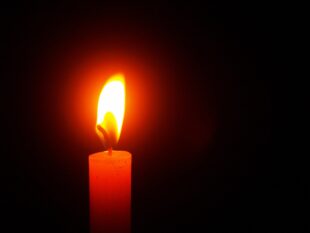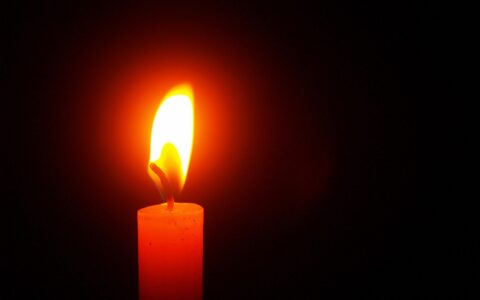Grief in a Loss that is Not a Death
Marty Robinette
 Grief over the death of a loved one is one of the most difficult experiences we face in this short time on earth. The circumstances surrounding death are many. They can come crashing into our lives unexpectedly, leaving us no time to prepare.
Grief over the death of a loved one is one of the most difficult experiences we face in this short time on earth. The circumstances surrounding death are many. They can come crashing into our lives unexpectedly, leaving us no time to prepare.
It can come as a long-anticipated outcome to a terminal disease, or the feared result of a collection of bad decisions that always loomed as a possibility. However, death is not the only loss we experience, and the process of grieving remains similar to that experienced with a death.
Many losses we experience do not include death but can still have a deep impact on our lives. It could be the loss of a job, a friendship, a dream, a home, a marriage, physical strength, mobility, cognitive functioning, childhood, or a sense of safety just to name a few.
These life experiences hold within them a part of ourselves that we have come to rely on and expect to always be there. But life has a way of changing mid-stream and throws us a challenge we can manage only with great difficulty.
What is grief over loss?
Someone has described grief over loss as an assault on the heart. It can be felt within the body through anxiety, sleep disturbances, or muscle tension. The fact that you feel these things verifies the deep impact of a loss. It is felt emotionally through sadness, depression, crying, hopelessness, despair, toxic thoughts, and fears. It can assault the spirit by focusing blame on God or directing the blame onto ourselves.
Life throws a myriad of experiences at us that we catalog in our brains and on which we often pass judgment. For example, if we grew up in an unstable home and our parents eventually split up, we might find ourselves having to take on an adult role way before our time.
The necessity of the moment forces this change and, in some ways, propels us to a productive level of responsibility. But at the same time, there is a loss – a loss of  childhood that the child might not be aware of at the moment, but a loss just the same.
childhood that the child might not be aware of at the moment, but a loss just the same.
I was listening to a podcast recently where they were combining a series of studies regarding the impact of Covid 19 on schools in America. It caused me to reflect on the experience as it impacted my family. Covid is the most impactful national emergency in my lifetime as well as for millions of other Americans.
The impact of COVID-19.
The death toll in America was 1,131,819 on the day I wrote this article. There are still 1,100 deaths in a week as of May 2023. The death losses are enormous, but this pandemic caused a host of other losses for people:
- The loss of a couple of years of normal contact with our friends and loved ones.
- The loss of feeling safe when you are just going to the store.
- The loss of a sense of security and safety by just normal living.
For many, this still hasn’t changed, or it’s at least a serious adjustment to go out and be in large groups of people again.
Loss upsets our sense of security and normalcy. We have come to expect things in our life to be relatively stable and believe that life will continue to flow as it always has. We develop unconscious expectations of this stability and when that gets disrupted it throws us for a loop. It challenges some of our basic assumptions and in some cases, our hopes and dreams.
Bad responses to loss.
When this happens, we naturally seek to make sense of the change or loss. Unfortunately, we can often come up with faulty explanations in our minds, and in some cases, we may even lie to ourselves in order to cope.
Denial.
 One classic thing we try to tell ourselves is that it doesn’t hurt. We may work to pick ourselves up by adopting a stoic persona, pretending we didn’t feel what we felt. Hurt is closely connected to anger, so if you find yourself a bit touchy, there’s a likelihood you are feeling hurt. This denial of feelings is a common response to a loss.
One classic thing we try to tell ourselves is that it doesn’t hurt. We may work to pick ourselves up by adopting a stoic persona, pretending we didn’t feel what we felt. Hurt is closely connected to anger, so if you find yourself a bit touchy, there’s a likelihood you are feeling hurt. This denial of feelings is a common response to a loss.
In an effort to not let others know how we are feeling, we work to deny or hide the emotions that well up inside. We do this in part because those feelings scare us. It tells us that not everything is under our control, which is actually true (though accepting it is tough).
We also don’t want anyone to think less of us by letting our emotions out because that is a risky venture. They might think bad things about us, which threatens our pride. Of course, feelings are what makes us human, and they tell us a lot about ourselves. So, listen to those feelings.
Self-blame.
Another tendency is to conclude that the loss was our own fault. Our minds are constantly working to make sense of the world. This can be a challenge when that loss upsets the image that we have in our minds of how things should be.
Inflation.
A common reaction is to inflate the significance of the event beyond what’s reasonable, such as thinking that life will never get better, this is a punishment from God, or if one was a better person this wouldn’t have happened.
Stages of the grieving process.
Whatever that loss is, whether something very significant or something rather small, there is often a grief response. You may have heard of some of the stages of grieving. The most well-known is that of Kubler-Ross. Though most agree that these stages do not occur in any particular order they usually are felt.
One of the first responses is denial. Denial is most commonly experienced when faced with a death but certainly can occur in a loss other than death. I think of the run-up to the war in Ukraine. Much of the country, including the leaders said they didn’t think Russia would invade, but they did. Millions of Ukrainians were displaced from their homes and fled to other countries just a few days after believing it wouldn’t happen.
 Another response is to get angry at something or someone. The loss is painful and disconcerting and there’s got to be someone to blame. If that loss is turned in on oneself as the source of the problem or is to blame it can lead to depression. Life can look bleak with little reason to think it might get better.
Another response is to get angry at something or someone. The loss is painful and disconcerting and there’s got to be someone to blame. If that loss is turned in on oneself as the source of the problem or is to blame it can lead to depression. Life can look bleak with little reason to think it might get better.
Bargaining is a stage where the person hopes to gain some control over the loss by internally negotiating a possible solution like being willing to sacrifice something or “what if I did …”. We might even try to do this with God, hoping something we do might change things.
The last stage is acceptance. Probably the hardest to arrive at in our internal struggle with the loss. I think of the story in Genesis where Jacob wrestled with God all night. That sounds more than exhausting. Jacob didn’t realize who he was fighting, but finally, the man he was wrestling with saw that he couldn’t prevail, because of Jacob’s stubbornness.
His response was to give a minor show of his power, where He threw Jacob’s hip out of place with the touch of his hand. At once Jacob recognized the power and presence of God. His perspective changed and he accepted his fate. In that acceptance was a blessing.
We can fight and wrestle with how things are, but ultimately, we are driven to acceptance. In many ways, it is an act of faith. To recognize that the loss had an impact on you and your emotions and to accept it as a normal part of human life rather than as some cosmic punishment or as evidence that you are inferior, takes some faith.
At that point, there can be understanding, peace, and a reason to move on. Refusing to accept the loss can lead to further pain and no direction to move forward.
Christian counseling for grief.
If you are struggling with the impact of some loss in your life, it would be my privilege to assist you in sorting that out and help to put it in context with the rest of your life. Just go to my picture on the website and click on the box that says “Schedule an appointment with Marty.”
Photos:
“Depressed”, Courtesy of JerzyGorecki, Pixabay.com, CC0 License; “Destruction”, Courtesy of Myriams-Fotos, Pixabay.com, CC0 License; “Grumpy Old Man”, Courtesy of Geralt, Pixabay.com, CC0 License; “Bright Candle”, Courtesy of 41330, Pixabay.com, CC0 License






